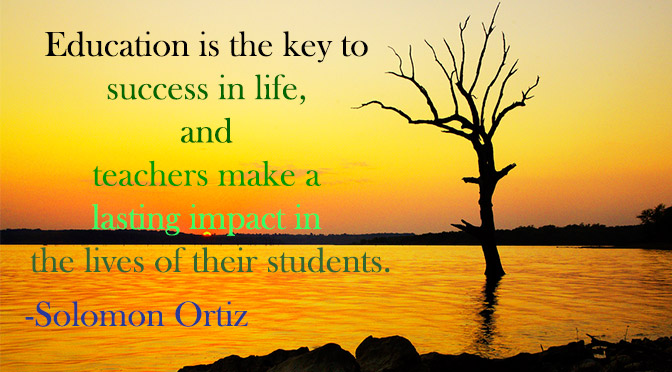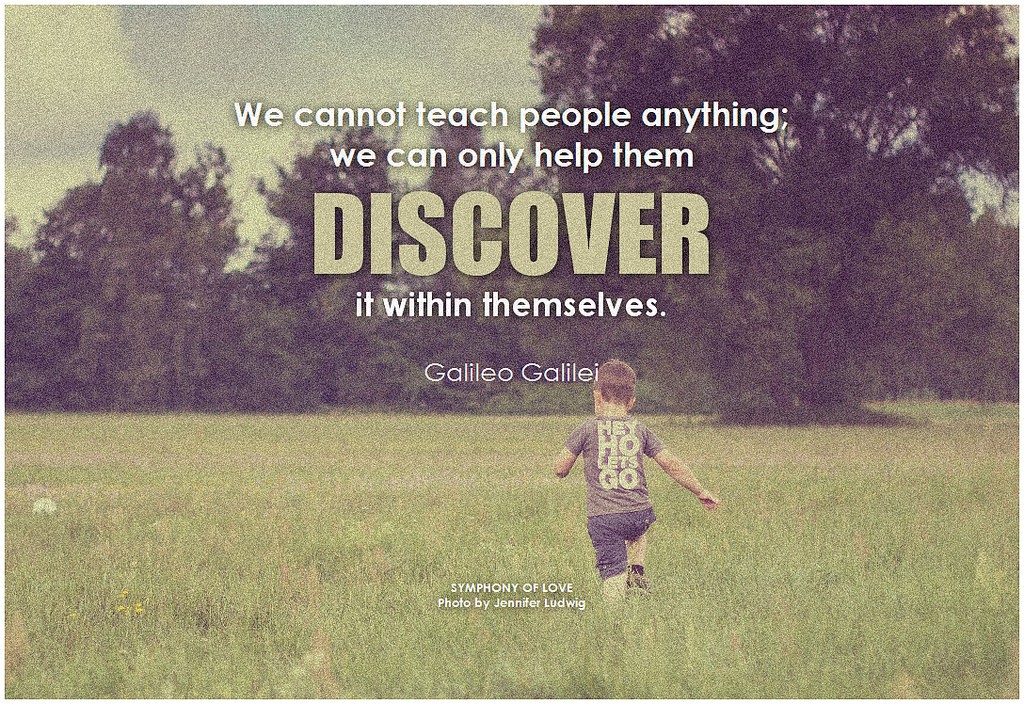Couple weeks ago, I put up a blog entry on why education is cool. I mainly focused that entry from the student/learner perspective, but this week, I explore a specific sub-topic that goes into the teacher/instructor perspective. Initially, this was going to be included in the other entry, but I decided to make it separate entry.
Why is every student important? What is the right belief going in to teaching? Why do many teachers end up switching professions? What makes teaching one of the hardest jobs out there? How do you deal with unruly students? What is the ultimate goal of a teacher?
Intro
First of all, I am going to start off with what my belief used to be and how that has changed over the years since High School. Then will come my takeaway point that is relevant in the broad picture of what education ought to be.
So what was my belief at one point? I used to believe that it is an educator’s job to try to get to as many students as possible, but I felt it was often not possible to reach every student.
How did I reach that belief? In all of my years going through K-12 school systems, I have seen many students that simply did not care at all and acted as if they did not want to be there. Not doing their homework was just the beginning; the behavior being emitted by these students was where the issue was. It often got to the point that it would become a distraction to other students. It could be a number of other things. They may protest by not doing their work or talk loudly during class. They may often do clownish things simply to get attention by causing trouble in class or making fun of the educator in middle of a lesson by loudly making obscene jokes. Some of this became hilarious but in a completely unprofessional negative manner and extremely disrespectful to the educator.
It was not just up to 12th grade but even college a couple times where the teacher/professor threw a student out of class (just simple “GET OUT!”). Of course, this sort of behavior was very rare at college level, but I observed it many times in my years from Kindergarten to High School level. Elementary school was not too bad as the hormones with puberty & teenage years did not start up until Middle-school and High school. A few times, it became dangerous as students actually became defiant and stood up to fight. Thankfully I never saw an actual student-teacher fight, but it came close a few times (usually good teachers are trained and know how to defuse a situation and calm things down quickly before it escalates to the point of no-return).
I noticed this behavior above, and that led me initially to conclude that it should be the educator’s job to try to teach everyone but to not bother or pay attention to students that try to get attention by causing noises, distractions, or insulting the teacher. I used to believe educators should focus on the students that actually care and want to be there and ignore those that don’t want to be there. Essentially, my point was ‘why should people care if you don’t want to be there?’
While it may sound like a sensible position (in some ways, it might be), it is absolutely not the right approach and not sensible in the bigger picture.
Why Every Student Matters
One of my teachers mentioned a belief that was much different, and it is a belief that I now openly accept as my own argument today. It was from my 12th grade English teacher. Her belief was this..
It is an educator’s job to reach every student, especially the students that try to draw attention by distracting class. They are distracting class not because they don’t want to learn, and it surely is not out of anger or hatred. They simply need more guidance along the way, and it does not help anyone if those students are pushed aside for somebody else to handle down the road. Who could even help them change or guide them once they become an adult? They may just end up in prison or worse.
Character and personality development all starts through their younger days. Without proper guidance at that stage, these students end up in much bigger trouble down the road if nobody is there to help them at the earlier stages. Often, the parents may be trying unsuccessfully or they may be working multiple jobs and may not be home much. If the teacher/educator is not there for that small nudge or guidance, their job has failed. Even if it is just one student out of hundreds or thousands that may have gone through their class successfully. One student is all it takes out of a thousand.
It is a tough reality to deal with, and the harder the student is to reach, the more stress gets involved. Every student can be reached in one way or another no matter what. Of course, it might take time, and time is what teachers often lack. Too much focus on helping one student might take time away from others that want to learn, and it is not the job of the teacher to babysit. You just do your absolute best. This is where many teachers give up and move onto other professions.
Why It Matters
I believe I was wrong because I was always one of those students that genuinely enjoyed learning. I was never a student that became involved in such unruly behavior, and I was never in the position of a teacher that had to deal with a regularly distracting student.
I have learned over the years that the educator that genuinely cares about each and every student are the educators that students learn the most from and come to be inspired by.
This applies to not just professional educators but any person that is ever in a position to teach anything, whether it is from a job perspective or some random person on the street. Teaching is never an easy job since every student has different personality and different ways of learning. The teachers that succeed the most are the ones that are able to adapt on the fly and be able to pay close attention to every student (assuming class size is manageable at 20 to 25 students or less).
College professors are not able to due to massive class size, but by that time, each student has matured and knows his/her responsibilities. The issue mainly lies between 5th to 12th grade stages (elementary school to a slightly smaller degree as students are not as defiant or hormonal at this stage).
Take Away Point
What is there to take away from all this?
I have reflected on this often over the years. Education is a multi-faceted issue to understand but also essential. As I mentioned above, teaching is even more difficult since you are dealing with students with many different personalities as every student has different learning style and different strengths and weaknesses. That is a given. Of course, teaching the material is only half the game. A good teacher would recognize that the other half is to inspire their students and instill in them their responsibilities to society & themselves. That is where the entire game changes.
Each student must learn how to learn. The teacher has to teach their students how to learn. The ancient proverb goes.. give a man a fish & he will eat for a day, teach the man how to fish & he will eat for a lifetime. Education is not for the next exam or next year, but it is for a lifetime. Most people don’t remember the specifics of what they learned 10-20+ years ago, but what they will remember is which teachers/professors/coaches/etc inspired them. Their character might also have been influenced by these teachers for the better.
So, how should it be dealt with?
Success should not be judged by the grades that a school system outputs. What good are grades when determining character of a student or behavior or determining what sort of person they turn into? Grades mean little to nothing when it comes to these things. Yes, exams may judge specific knowledge but not character or potential or ANY intangibles. Many people do not understand this, and it drives me crazy. You are setting yourself for failure from the beginning if you focus more on grades than the actual student. If you focus on the individual, good grades WILL follow.
Over $630 billion dollars in 2012 were pumped into US education by politicians to turn this around, yet the results are not very good. US spends by far the most on education on Earth but has far from the best education system (for K-12 anyways).
“Today we’re spending more than $600 billion a year in public schools across the [USA], and few of us are happy with the results. Over the last five decades, in fact, U.S. education spending has skyrocketed by 350%, yet achievement levels have remained stagnant… Nationwide, schools report that only 51% of education dollars actually make their way into classrooms. This has to change.” (Rhee, 2014)
Clearly, if only 51% of the total education spending ends up into the classroom, SOMETHING IS WRONG! Where is the rest going? It is not like teachers or counselors are taking up the remaining $300 billion as they only make $55,000 on average or less with a much lower starting salary. Obviously, the money goes somewhere else from state-to-state but I don’t know where!
What many politicians don’t understand is that they expect throwing billion here and billion there solves everything, but it alone does NOT solve things; it must start with the right mindset first and foremost. I believe just 100 teachers that can inspire their students would have much more impact to the community and the world than 1,000 teachers that may not. It is not about quantity of teachers or the amount of money being thrown around but about efficiency, effectiveness, and knowing how to inspire. It is ultimately about preparing the student for their greatest test of all: life.
This is why we return to the notion that every student matters. Every generation is the future of civilization. If every student is properly prepared and educated, they will pass what they know onto their next generation. It must be an endless cycle of improvement as it has always been. Every student has something within themselves to contribute to civilization, and teachers are the people that have a hand in enabling these students.
- My Favorite Books - February 7, 2024
- Review of Carl Sagan’s The Demon-Haunted World - January 31, 2024
- The 75 Greatest Films of All Time - December 22, 2023







